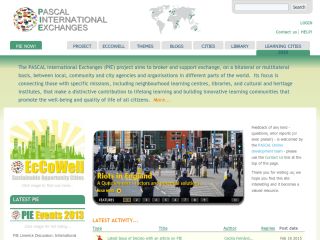Promoting Active Citizenship in Europe - The Role of University Continuing Education and Lifelong Learning
Edinburgh, Unit Kingdom
Democratic citizenship focuses on the rights, responsibilities and roles of citizens at the local, national and global level. However, defining concepts, policies and strategies to support good practice in the area of democratic citizenship is no easy task.
European citizenship is made up of a set of fundamental rights and obligations enshrined in the Treaty of Rome. The Maastricht Treaty (1992) aimed to strengthen the protection of the rights and interests of the nationals of its Member States through the introduction of a citizenship of the Union and the Treaty of Amsterdam (1999) extended citizens rights/obligations against discrimination on the grounds of sex, racial or ethnic origin, religion or belief, disability, age or sexual orientation and affirmed the commitment of each Member State to raise quality and free access to education at national level.
What do European citizens need to do to become active citizens? How should lifelong learning in universities be responding to this challenge? Are there examples of good practice in the European Union and what is the future role for lifelong learning in universities?
The conference, which is being held to mark the year of ‘Intercultural Learning’ (2008), is seeking to answer some of the many questions posed by the concept of active citizenship, particularly when applied to continuing education/ lifelong learning in universities.
Keynote speakers confirmed:
- Prof Ramon Flecha (University of Barcelona)
- Prof Tom Schuller (NIACE)
- Ms Angela Vegliante (EACEA - European Commission)
Call for Papers
We invite you to send your contributions and to participate in this conference. Our open Call for Contributions will operate in three stages:
- Applications to make contributions must be received by EUCEN by the deadline of 15 February 2008. The abstracts must be submitted using the on-line form (please visit the conference web site <http://www.lifelong.ed.ac.uk/eucen2008/>).
- EUCEN will contact the author of each abstract starting on 05 March 2008 to confirm whether his/her submission has been accepted.
- EUCEN will provide guidelines, which should be followed, for those selected authors invited to submit a full paper. These full papers will be included in the proceedings of the conference. The deadline for submission of the final papers to EUCEN is 15 April 2008.
Rules:
- Any full paper submitted for consideration before 05 March 2008 without having gone through the above process will not be accepted.
- At least one of the authors of each abstract/paper must register to attend the conference.
- For more details, please follow this link <http://www.lifelong.ed.ac.uk/eucen2008/> or contact:
Carme Royo <[email protected]> <mailto:[email protected]> - EUCEN or
Con Gillen <[email protected]> <mailto:[email protected]> - University of Edinburgh
Please, forward this message to any colleagues you thing might be interested.
We look forward to receiving your contributions!
 Printer-friendly version
Printer-friendly version- Login to post comments
- 311 reads
- Calendar






